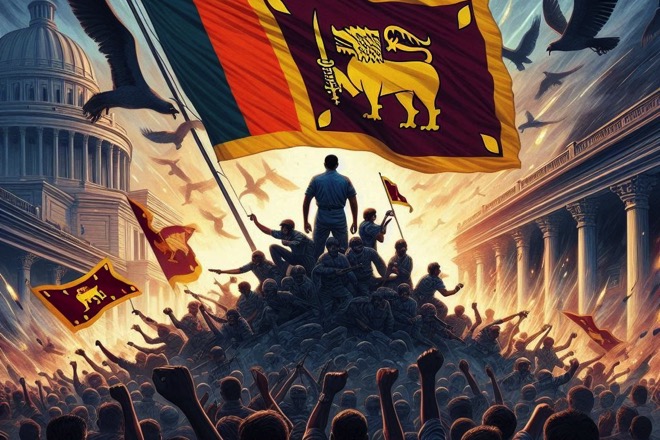By Jithendra Antonio
As Sri Lanka emerges from an unprecedented economic crisis that has shaken the foundations of its society, the nation stands at a pivotal crossroads. The upcoming presidential election on September 21, 2024, presents an opportunity for transformative leadership capable of steering the country toward economic recovery, social equity, and sustainable development. The next president must possess not only a clear vision but also the pragmatic skills necessary to navigate the complex challenges ahead.
The Economic Landscape, A Crisis Unfolded
The economic turmoil that engulfed Sri Lanka in 2022-2023 was marked by staggering statistics: a GDP contraction of 9.5%, inflation soaring to 46.4%, and public debt reaching an unsustainable 119.2% of GDP. The crisis was exacerbated by a series of policy missteps, including a poorly managed transition to organic farming that decimated agricultural output, leading to widespread food insecurity. By the end of 2022, over 24% of households faced food insecurity, a stark reminder of the human cost of economic mismanagement.
The next president must prioritize economic recovery through strategic reforms. For instance, the International Monetary Fund (IMF) has highlighted the importance of a robust debt restructuring process and the implementation of structural reforms to restore fiscal stability. A successful example can be drawn from countries like Greece, which, after years of austerity and economic turmoil, began to see recovery through comprehensive reform programs and international support. Sri Lanka can similarly benefit from engaging with international financial institutions to secure necessary funding and technical assistance.
Strengthening Democratic Institutions must be a ‘Call for Accountability’
The concentration of power within the presidency has long been a contentious issue in Sri Lanka. The current constitution grants extensive powers to the executive, undermining democratic governance and accountability. The next president must be willing to reform this system, reducing executive powers and enhancing parliamentary authority.
A case study in democratic reform can be found in post-apartheid South Africa, where the transition to a more inclusive governance structure was essential for national healing and stability. By empowering parliament and ensuring respect for the rule of law, the next president can foster a more transparent and accountable government, restoring public trust eroded during the crisis.
Addressing Social Inequalities must be a ‘Path to Inclusivity’
The economic crisis has disproportionately affected the most vulnerable populations in Sri Lanka, exacerbating existing social inequalities. The next president must prioritize policies that protect marginalized groups, including rural communities, women, and the elderly. Investing in social safety nets, healthcare, and education will be crucial for promoting inclusive growth.
For instance, the implementation of targeted social assistance programs in countries like Brazil has effectively reduced poverty and improved living standards. By adopting similar strategies, Sri Lanka can ensure that economic recovery benefits all citizens, not just the affluent.
Engaging with the International Community must be a ‘Diplomatic Balancing Act’
In an increasingly interconnected world, Sri Lanka's next president must adeptly navigate the complex geopolitical landscape. Securing aid and investment from foreign donors and multilateral institutions will be vital for financing recovery efforts. Balancing relationships with major powers such as India and China will also be essential to protect national interests.
Sri Lanka's historical ties with India can serve as a foundation for strengthening economic cooperation, particularly in sectors like tourism and technology. Conversely, engaging with China for infrastructure development presents opportunities for growth, provided that such engagements are transparent and beneficial to the local economy.
A Single Policy for Procurement to Combat Corruption
To effectively combat corruption, the next president must implement a unified procurement policy. This policy should mandate transparency and competitive bidding processes for all government contracts. By centralizing procurement under a single, independent authority, the government can ensure that all transactions are conducted with integrity, minimizing opportunities for corruption and fostering public trust.
Essential Qualities of the Next President
To meet the formidable challenges ahead, the next president must embody a unique blend of qualities:
- Economic Expertise: A deep understanding of macroeconomic principles and experience in fiscal policy formulation will be essential for effective governance.
- Leadership and Crisis Management: Proven ability to lead during crises, make tough decisions, and inspire confidence among citizens and stakeholders.
- Negotiation Skills: Proficiency in negotiating with international creditors and investors to secure favorable terms for debt relief and investment.
- Visionary Thinking: The capacity to articulate a clear and compelling vision for Sri Lanka's future, galvanizing support for necessary reforms.
- Commitment to Transparency: A track record of advocating for anti-corruption measures and promoting accountability in governance.
A Defining Moment for Sri Lanka
As Sri Lanka approaches the 2024 presidential election, the choice of the next leader will be a defining moment in the nation's history. By prioritizing economic recovery, democratic reforms, social equity, and good governance, the next president can lay the groundwork for a more prosperous, stable, and resilient Sri Lanka.
The path forward will not be easy, but with the right leadership, Sri Lanka can overcome its challenges and emerge stronger, embodying the resilience that has characterized its people throughout history. The world watches closely, and the time for decisive action is now.

(The writer is a Consultant specialised in Data Analytics with a Special Focus on Sri Lanka’s Future Direction, and in the fields of Sustainable Energy, ESG, Investments and telecommunications. He can be reached at jithendra.antonio@gmail.com.)

